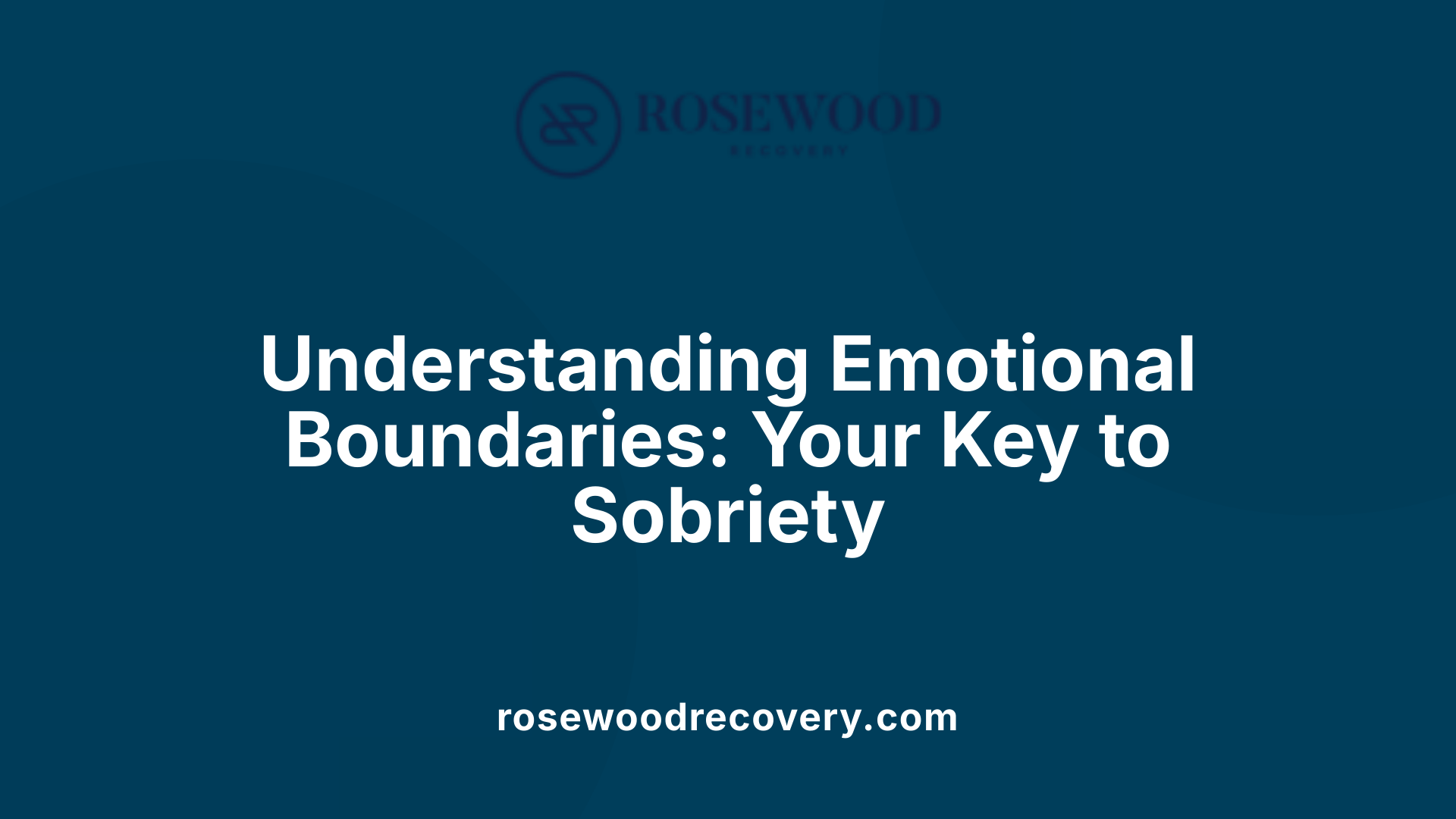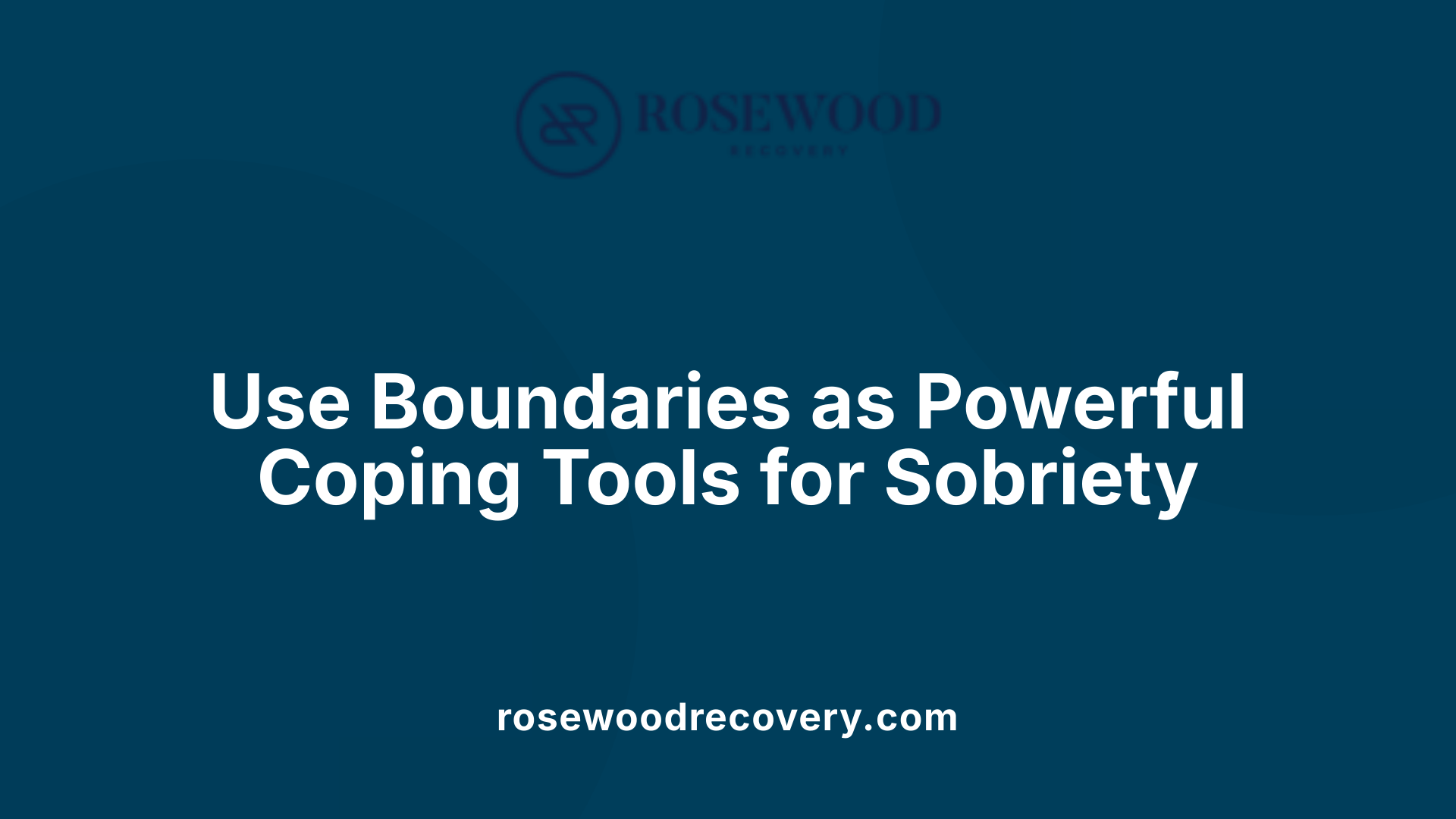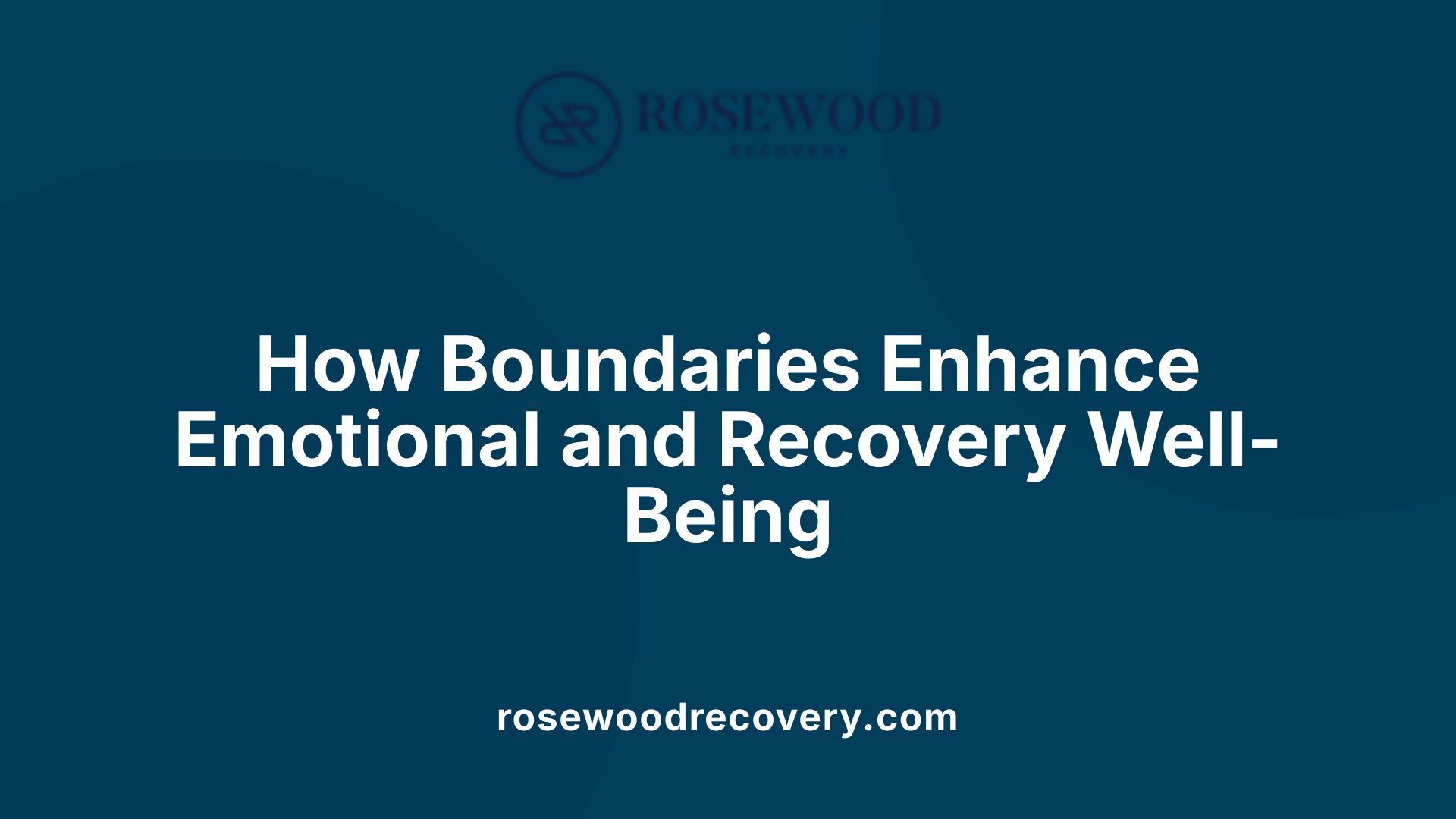Unveiling the Emotional Core of Boundary-Setting in Recovery
Establishing emotional boundaries in sobriety is more than a practical step; it is a vital emotional process that underpins success in recovery. These boundaries serve as internal guidelines, protecting mental, emotional, and physical health, enabling individuals to foster resilience, self-respect, and supportive relationships. This article explores the psychological and emotional dimensions of boundary-setting, emphasizing their importance in safeguarding sobriety and promoting personal growth.
The Significance of Emotional Awareness in Boundary Formation
What role does emotional awareness play in setting healthy boundaries during recovery?
In the process of recovery from addiction, emotional awareness is an essential component for establishing and maintaining healthy boundaries. It involves being mindful of one's true feelings, needs, and limits, which are often obscured or complicated during active addiction.
By developing emotional awareness, individuals can better recognize when they are feeling stressed, overwhelmed, or unsafe—key signals that a boundary may need to be set or reinforced. This self-awareness allows them to identify external situations or relationships that threaten their emotional or physical well-being.
Recognizing true feelings helps individuals communicate their boundaries authentically and assertively. Instead of reacting impulsively, they can explain their needs clearly, fostering healthier interactions and preventing conflict or boundary violations.
Furthermore, emotional regulation, fostered by heightened awareness, reduces impulsiveness and emotional overload, which are common triggers for relapse. When individuals know how they feel and why they feel that way, they are better equipped to manage their emotions constructively.
In practical terms, emotional awareness supports setting limits around toxic relationships, overcommitment, or environments that pose risks to sobriety. It also encourages self-compassion, allowing individuals to forgive themselves after setbacks and quickly return to boundary reinforcement.
Overall, emotional awareness serves as a foundation for creating boundaries that protect mental, emotional, and physical health. It empowers individuals in recovery to feel more in control of their lives, fostering resilience and long-term sobriety.
Understanding Emotional Boundaries in the Context of Sobriety

What are emotional boundaries and how do they look like in recovery?
Emotional boundaries are personal limits that define how we want to be treated within our relationships. They serve as guidelines to protect our feelings from being exploited, dismissed, or overwhelmed. In the journey of recovery, these boundaries play a crucial role in safeguarding our emotional health. They help us avoid resentments, reduce burnout, and prevent emotional manipulation from others.
In practice, emotional boundaries might involve asserting our needs and feelings honestly and kindly. For instance, saying no to requests that drain our energy, or choosing not to engage in conversations that trigger negative emotions. It also includes limiting our emotional sharing with individuals who respond negatively or dismiss our feelings.
Setting and maintaining these boundaries can be challenging, especially initially, as feelings of guilt or fear of offending others often surface. Support from therapists, mentors, or sober communities can be instrumental in building confidence and skills necessary to uphold these limits.
By establishing and respecting emotional boundaries, individuals in recovery foster self-esteem, practice self-compassion, and promote healthier interactions. This promotes an environment of mutual respect, essential for emotional well-being and sustainable sobriety.
Boundaries as a Coping Mechanism to Sustain Sobriety

How do setting boundaries serve as a coping mechanism in sobriety?
Establishing boundaries plays a crucial role in helping individuals maintain their sobriety by creating a buffer against potential triggers and high-stress situations. When people in recovery set clear limits on their interactions, environment, and personal space, they can better manage emotional and physical stress.
Boundaries act as a protective shield, guiding how others treat them and ensuring that relationships remain supportive and respectful. This minimizes encounters with toxic people or environments that might encourage relapse.
Additionally, defining personal boundaries enhances self-awareness. It helps individuals recognize their needs, strengths, and weaknesses, fostering a sense of control and confidence in their recovery journey.
By reinforcing personal control, boundaries make it easier to say no to unhealthy influences and to prioritize self-care routines like exercise, adequate sleep, and proper nutrition. These consistent health practices are fundamental in building resilience.
Healthy boundaries also promote honest communication with peers, sponsors, or therapists. They pave the way for open dialogue about needs and limits, reducing misunderstandings or feelings of being overwhelmed.
In conclusion, setting boundaries serves as a vital coping strategy by fostering a safe environment, minimizing triggers, and strengthening one’s sense of personal control. This multi-faceted approach supports ongoing sobriety and encourages a stable, fulfilling recovery process.
Psychological Strategies for Creating and Upholding Emotional Boundaries

What are the psychological approaches to creating and maintaining emotional boundaries in sobriety?
Establishing and maintaining emotional boundaries during recovery involves a range of psychological strategies aimed at fostering self-awareness, self-respect, and resilience. Therapeutic approaches such as Cognitive Behavioral Therapy (CBT) are widely used to help individuals identify and challenge negative thought patterns, beliefs, or habits that may lead to boundary violations or emotional vulnerability. CBT encourages individuals to reframes their thinking and develop healthier ways of interacting.
Another effective method is Mindfulness-Based Stress Reduction (MBSR). Mindfulness practices improve present-moment awareness, allowing individuals to recognize emotional triggers early and respond thoughtfully rather than react impulsively. This heightened awareness supports boundary setting by helping people understand their internal emotional states and recognize when their limits are being crossed.
Assertive communication is a cornerstone of boundary maintenance. Techniques such as using 'I' statements, calmly expressing needs, and stating limits clearly empower individuals to convey their boundaries confidently and respectfully. Regular self-care routines further reinforce emotional boundaries by nurturing one’s mental and physical health.
Psychological barriers like guilt, fear of rejection, or worry about offending others often hinder boundary setting. Addressing these self-limiting beliefs through therapy or self-reflection is crucial. Recognizing internal fears and working through them helps individuals stand firm when boundaries are challenged.
Understanding interpersonal dynamics, for example, being aware of roles in the Drama Triangle—victim, rescuer, persecutor—can prevent manipulative or codependent behaviors that threaten emotional stability. Learning boundaries in the context of relationships enables healthier interactions and supports ongoing recovery.
In summary, combining therapies like CBT and mindfulness, practicing assertiveness, addressing psychological barriers, and enhancing understanding of relational patterns create a strong foundation for sustaining emotional boundaries. These strategies support a compassionate, mindful approach to recovery that prioritizes emotional safety and well-being.
The Impact of Boundaries on Emotional and Recovery Well-Being

How do boundaries impact emotional well-being and recovery progress?
Establishing healthy boundaries is crucial for maintaining emotional safety and stability, especially during recovery from addiction or mental health challenges. Boundaries act as personal guidelines that protect individuals from triggers, toxic relationships, and overwhelming demands. When boundaries are clearly defined and enforced, they create a sense of control, self-respect, and security. This not only reduces stress but also minimizes the chances of emotional burnout or relapse.
In recovery, emotional boundaries help individuals manage their feelings effectively. By recognizing their limits and communicating needs assertively, they foster healthier interactions. This supports emotional regulation and resilience, enabling them to better cope with setbacks or difficult situations.
Furthermore, boundaries promote supportive relationships rooted in mutual respect. They help establish trust and clarity, which are vital for ongoing recovery. As individuals reinforce their boundaries, they often experience an increase in self-esteem and confidence, reinforcing their sense of worth.
Overall, boundaries serve as foundational tools that nurture mental health and foster a feeling of autonomy. They empower individuals to prioritize their well-being while maintaining meaningful, respectful connections. This combination of emotional safety and structured support facilitates sustained recovery progress, making boundaries an indispensable part of long-term healing.
Building Healthy Boundaries: Practical Steps and Challenges

What are practical tips for establishing boundaries?
Setting boundaries is an essential part of recovery that helps protect emotional and physical well-being. Practical tips include knowing your personal limits and respecting them. It’s important to avoid environments or people that may trigger old habits or temptations.
Forgiving yourself after setbacks is vital; recovery isn’t linear, and slips are part of the process. Focus on self-care routines such as regular exercise, proper nutrition, and adequate sleep to reinforce your boundaries and overall health.
Starting small helps build confidence. Practice saying no to minor requests or demands that drain your energy or cross your limits. Consistency in these actions reinforces your boundaries and builds self-esteem.
Seeking support from trusted sources like friends, sponsors, or therapists can provide encouragement and accountability. They can help you articulate your needs and stand firm when boundaries are tested.
Effective communication is fundamental. Use clear, assertive language and ‘I’ statements to express your needs respectfully. For example, “I need time to focus on my recovery,” rather than blaming or confrontational language.
Listening to your internal cues, such as feelings of discomfort, resentment, or stress, helps identify where a boundary might be needed. Regularly reevaluate your boundaries to adapt them as you grow and recover.
Patience and self-compassion are vital during this ongoing process. Establishing healthy boundaries is a skill developed over time, and it’s normal to encounter challenges along the way. With perseverance, boundaries will serve as strong support for a sober, balanced life.
Embracing Boundaries as a Foundation for Lasting Sobriety
Establishing and maintaining healthy emotional boundaries is not a one-time effort but a continuous journey rooted in self-awareness, assertiveness, and compassion. These boundaries serve as essential tools that protect mental, emotional, and physical health while fostering respectful and supportive relationships. As recovery progresses, boundaries become integral to emotional regulation, resilience, and self-esteem, reinforcing a sense of control and purpose. Embracing boundaries empowers individuals to navigate the complex emotional landscape of sobriety confidently and compassionately, ultimately supporting a sustainable and fulfilling recovery path.
References
- What do healthy boundaries look like in recovery? - MHA Screening
- Staying Grounded: Healthy Boundaries in Addiction Recovery
- The Importance of Setting Boundaries in Recovery - Bold Health
- Setting Boundaries with an Addict - Gateway Foundation
- Setting Boundaries in Recovery | San Antonio, TX
- The Importance of Boundaries in Maintaining Sobriety
- Boundaries in Recovery: Why Are They Important? - Ambrosia
- Setting Boundaries in Recovery for Lasting Success



.jpeg)
